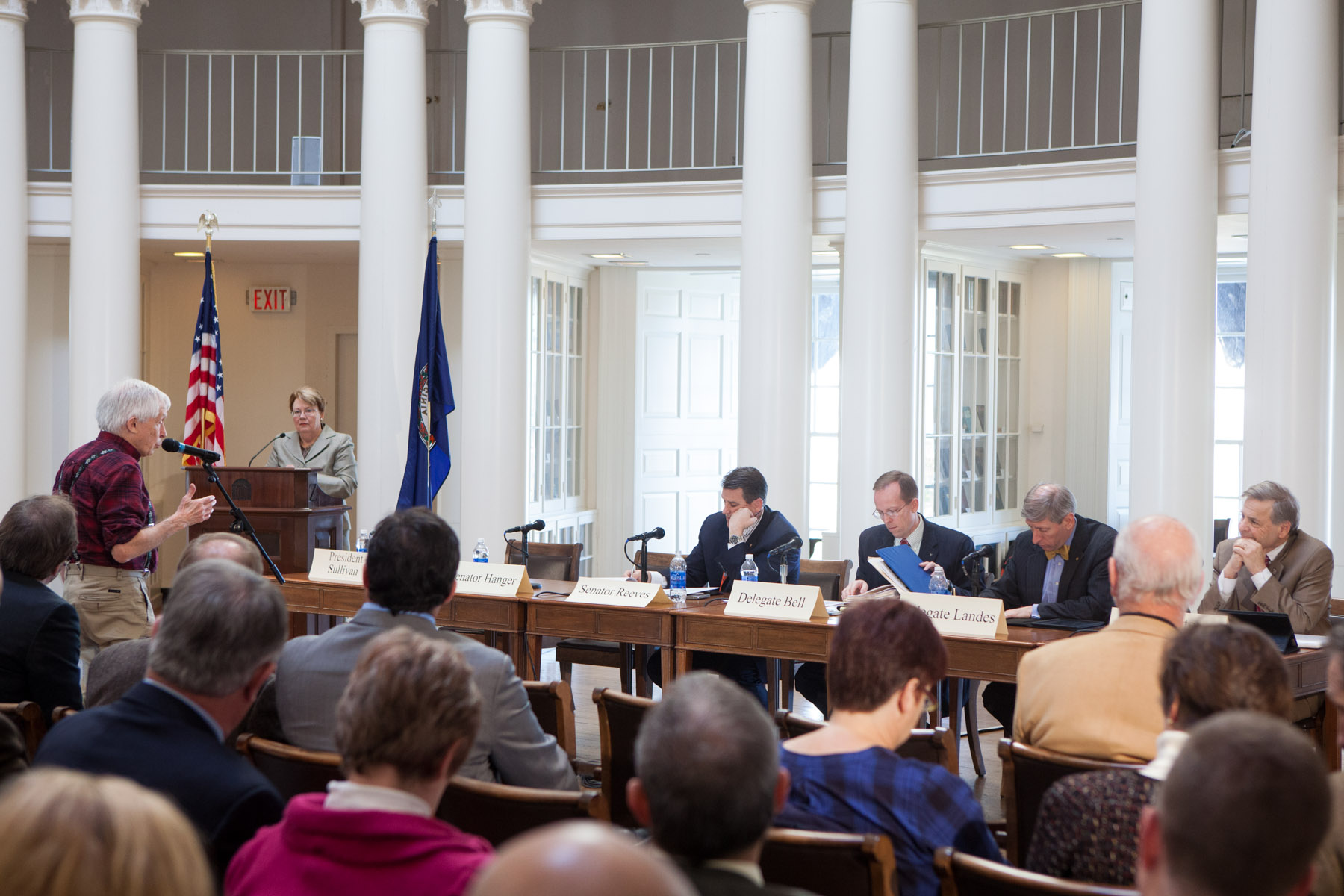Area legislators, speaking Wednesday at the Dome Room of the University of Virginia’s Rotunda, addressed a number of issues facing the state, including increasing the gasoline tax, the impact of federal government sequestration on the state’s economy and governance issues at the University.
Sen. Bryce Reeves (R.-Fredericksburg), Del. Robert Bell (R-Charlottesville), Del. R. Steven Landes (R-Verona) and Del. David J. Toscano (D-Charlottesville) attended the annual legislative forum hosted by University President Teresa A. Sullivan. Each legislator gave opening remarks previewing the upcoming session of the General Assembly, which starts Jan. 9, and then the quartet responded to questions from the audience.
All four cited the need to address transportation issues in their remarks, but split when the question of a gasoline tax hike arose during the question-and-answer period.
Reeves said that a gasoline tax hike would not solve the state’s transportation problems and that a comprehensive solution was needed. He also said that it was highly unlikely that gasoline taxes would be raised in an election year; the entire House of Delegates is up for election in November.
Bell also declined to support a gasoline tax increase, noting that in his 11 years in office Virginia’s budget had increased at a pace beyond both the rates of inflation and state population growth. He said there would be a need to prioritize expenditures, and if transportation is a critical issue, then it should get more of the existing funds.
Landes said a gasoline tax was unsustainable, especially with more fuel-efficient cars and alternate-fuel vehicles, but said there are people in Richmond considering a “BTU tax,” which would levy a tax on electricity, natural gas and other vehicle fuels. He said this was an option that should be explored, but he did not foresee it being implemented soon because there are a lot of details to work out.
Toscano rejected taking transportation funds from other parts of the budget, citing the needs of public education, police and mental health budget lines. He said a 10-cents-per-gallon hike in the gasoline tax would generate $500 million to close the transportation maintenance deficit. He also noted that the gasoline tax had not been raised since 1986 and should be indexed to inflation.
While highway expenditures were on everyone’s list, the legislators were also concerned about the potential impact of the federal budget sequestration on the state should the federal “fiscal cliff” negotiations fail. The automatic measures in place, should no agreement be reached, call for extensive cuts in military expenditures. Reeves estimated that potential Department of Defense reductions could cost about 207,000 jobs in the state; Bell warned that the Northern Virginia economy is a driving force in the state budget, and if that economy is crippled, then the impact would be felt statewide. He also noted that there are defense and defense support industry jobs in the Central Virginia economy that could be hurt.
Landes said Gov. Robert F. McDonnell has budgeted about $30 million to help businesses and localities with problems related to sequestration, but cautioned that the state will need to get along with less federal money.
“There will be federal cuts, and they are only looking at about 10 percent of the deficit,” he said.
Toscano said local jobs will be affected through federal cuts and said the state must brace for it. “We don’t know what will happen if we go off the fiscal cliff,” he said. “But when it happens, Virginia is the first one of the box that will have to deal with it.”
The legislators also addressed governance issues at U.Va. following the incident this past summer when Sullivan resigned and was subsequently reinstated by the Board of Visitors.
Landes said he would not support the re-appointment of Rector Helen E. Dragas, noting the issue must go through a senate committee, a committee in the House of Delegates and then be voted on by members of the House of Delegates.
Toscano also said he could not support Dragas. He noted that legislation is already drafted to require non-voting student and faculty members to boards of visitors across the state, and to change how board members are appointed.
Landes called for board members to be trained on their responsibilities as public officials, and said he would like them to be more accountable to the General Assembly.
Bell said the issue was larger than the situation that arose this summer and suggested there should be some distance between the event and reviewing it to determine problems and devise solutions.
Bell also said he is working on two crime bills, one having to do with the financial abuse of the mentally incompetent and one that would generate swift consequences for probation and parole violators.
Media Contact
Article Information
December 19, 2012
/content/local-legislators-review-issues-general-assembly-forum

